Please enjoy this guest article by Andrew Buonopane! Spoilers for the first episode of Agents of S.H.I.E.L.D.
Disney’s ABC’s Marvel’s Agents of S.H.I.E.L.D. premiered Tuesday to adequate ratings, and is off to the commercially promising start its creators intended. It is difficult to deny the show’s primary purpose (to make enough money to fund Joss Whedon’s production of the complete works of Shakespeare twice over), and other sites have already likened the first episode to a police procedural with Marvel badges. However, in a recent EW interview, Whedon indicated that it’s “basically a TV series of ‘The Zeppo’ [an episode of Buffy the Vampire Slayer], which was a very deliberate deconstruction of a Buffy episode in order to star the person who mattered the least. The people who are ignored are the people I’ve been writing as my heroes from day one.” Following on this, there is much to indicate that it will be more than just a money-grab.
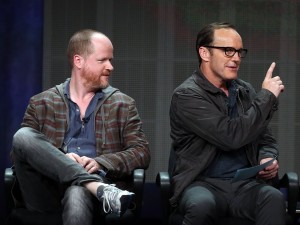
Though it will also be that.
Though we’ll definitely have to wait to get a statistically significant sample, in its first episode the show has evidenced a meta-textual commentary on the relationship between works of its predecessors’ ilk and the audience. The pilot is a reflection on the impact that superhero movies—and action-adventure movies in general—can have on the pop-culture consumer.
There are at least two good reasons for ABC’s new series to do this independent of meta-textual concerns: commercial association with the Marvel property and narrative legitimacy. The explicit references to each Avenger except Hawkeye remind people that they ought to keep tuning in for more of what they saw in theaters. Furthermore, the incorporation of plot elements from Marvel movies up to and including Iron Man 3 justify that commercial association by demonstrating the relevance of this new story to the established canon.
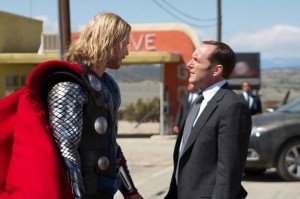
That’s a nice cape. Can I tell people I know you?
However, there is also an ongoing discourse within the episode about what happens when audiences of the standard action movie really get the point of the power narrative. The heroes aren’t just talked about as commercial buzzwords or plot factors; They’re treated like the pop culture heroes they are in our world. They have in-universe action figures, people dress up as them (as in the closing montage of Avengers), and they are referenced (or reverenced) right alongside other pop culture figures that are fictional within the diagetic world of this cross-platform Marvel continuity.
What happens in the show is like what would happen if we talked about Seal Team Six alongside the Magnificent Seven, or started selling un-ironic action figures of Sully Sullenberger. It’s not quite direct enough to break the fourth wall, but the kind of signification at play is more than an allegory. It not just that superheroes are real and living among us, it’s that within the fictional world people’s reactions to them are indistinguishable from our reactions as audience members. But for them, it’s “real,” so the interactions are more immediate, whereas for us, the effects of these stories take time to sink in.
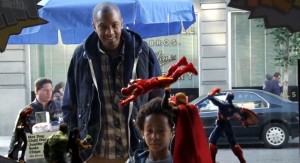
We see this immediate interaction chiefly through the two characters that are proxies for the audience: Skye and Mike Peterson. At first glance, Skye is just an outsider who is brought into the team to serve as a love interest for Grant Ward, the stock action hero who appears to be the main protagonist in the first half of the episode. But she turns out to be resourceful and nerdy, displaying hacker skills and admitting to partaking in cosplay at Stark Tower. The most interesting development is the narrative prominence she gains during the interrogation scene. Just as Phil Coulson and Ward are about to administer the best truth serum ever, Phil inverts the dynamic of subject and object, injecting Ward with the serum. Phil submits his ace action hero to her scrutinizing gaze to gain her trust and motivate her to join the Agents of SHIELD.
At this point in the episode, the focus shifts decisively away from Ward and toward Skye, with Ward now serving as her “love interest”. While in many shows, the audience identifies directly with the action hero, the second half of the pilot indicates that we are to identify with the character who is at some level a fan of the franchise, just as we are, as well as a knowledgable pop culture geek, just as we are—in addition to the aforementioned cosplaying, she makes numerous Whedonesque pop culture references, from the in-universe Avengers to Terminator and back again. Her developing relationship with Ward seems to be laying the groundwork for a dynamic which will explore the process of fandom: how fans are attracted to action heroes and desire to associate with them.
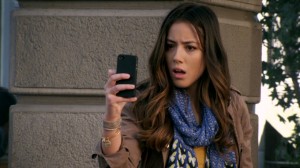
Mike, a hard-working American man who shares an interest in comic book heroes with his son, displays great awareness of common themes in the superhero genre and in American culture generally: good guys and bad guys, origin stories, etc. He is an American consumer who has absorbed some of the broader messages of modern storytelling. He has fallen on hard times in recession-era America, but tries to follow in the footsteps of his heroes: he gains superpowers to protect what he cares about.
His downward spiral gives the lie to his cherished American notion that as long as you are a good person, believe in yourself, and work hard, you’ll be successful. He becomes the villain he always rooted against, but in his mind he hasn’t done anything wrong: he only did what the world around him has extolled. This reaches a morally ambiguous resolution in the episode’s climax when Mike expresses his grievances to Agent Coulson, who serves as the ambassador between the normal people (the audience) and the heroes. He lays the blame for everything he’s been told on Phil, who’s standing in for the culture as a whole.
Mike has grown skeptical of the beliefs he gained from the culture, due to the actual presence of super-powered beings. He is struggling with how to be faithful to the lessons he learned from heroes when their abilities seem to render the application of those lessons futile. He sets all this out before Phil,who essentially repeats what Mike has always been told. Then Mike is knocked out, ensuring the safety of the innocent bystanders. The Agents of Shield have saved the day… sort of. The agents have saved Mike from himself, but is he better off in the end? Coulson says something about how he’ll turn it around, but it’s left very ambiguous, and his concerns are never really addressed, just restated.
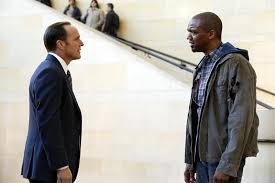
Not an Optimistic Picture.
There are a lot of different directions that this show could go, but I think the basic spirit of the show’s intentions are summed up when Skye and Mike are talking early in the episode. This conversation seems to be the thesis for the show to either prove or refute: Either power ought to be sought for the greater good as superheroes have always done, or else these narratives have left us reality-fettered mortals ill-equipped to emulate our heroes. Or somewhere in between.
In the soon-to-be famous words of Skye, “with great power comes…. a ton of weird crap you are not prepared to deal with.”
Andrew Buonopane majored in Seinfeld references in college and is now making the obvious transition into studying for the Catholic priesthood near Washington, DC . He contributes to the seminarian blog and can be contacted by email.
Did you like Marvel’s Agents of SHIELD? What do you think about the relationship between real-life superheroes and their real-life audience? Sound off in the comments.

Overall, I liked Agents of S.H.I.E.L.D. There was a nice combination of humor and mystery to keep things going. The relationship between so called real-life heroes and their audience will certainly be a recurring theme of the series but I don’t necessarily see this as the major point to drive the series forward. During the series, if the viewer (and the agents themselves, of course) doesn’t come to doubt that S.H.I.E.L.D. is a good thing, Whedon, Whedon and company will have missed a huge opportunity.
The underlying premise of the series is that it’s a good thing to have a third party group like S.H.I.E.L.D. out there to create a barrier between the publicly weird and dangerous world that the world has to face following the Avengers movie and “normal” folks. So I expect we’ll get into things like “the end justifies the means” stories, conform or be threatened stories somewhat like The Wire, and plenty of heroic adventure stuff.
I actually worry that focusing too much on the relationship between the public and the public figure or God is going to make this series go down the rabbit hole and most viewers head for the exits UNLESS it’s hella entertaining. I just don’t think you can build a series around that which seems to be so straightforward, not withstanding the humor that we’ve seen so far.
The thing that intrigues me the most at this point is the return of Coulson, who/what is he now and what impact will that have on the series, the agents, and S.H.I.E.L.D. itself. I have a suspicion that we’re going to have a BIG TIME reversal or twist around the series that specifically relates to the return of Coulson.
Also, I expect the cast to start dying off soon, a member every few episodes. Naw, too cynical.
I’m wondering if another route they’ll take is one critiquing invasive intelligence gathering. There was a passing reference to an “unregisterd super” or something in reference to Mike’s super powers. It called into mind proposals for lists of gun owners or people on ADHD medication, records of library activity, and other ways various government entities may or may not “keep track” of U.S. citizens. And with that, I’m very much reminded of the various “registration acts” that are written into superhero comics from not just Marvel, but also DC (like the Mutant Registration Act from X-Men or the Keene Act in Watchmen. Coulson was pretty blatant about how Mike was dangerous not because he had powers, but because an implied baddie could get their hands on him and use his powers for their purposes. I see the beginnings of conflicts over autonomy, personhood, citizenship, duty, and responsibility creeping in because of that. Because I find it easy to buy that could S.H.I.E.L.D. end up essentially kidnapping people with superpowers, and I don’t think Whedon would miss that opportunity to show S.H.I.E.L.D. agents question and perhaps even defy their orders- because they’re in one of those utilitarian dilemmas where, say, it’s either lock up the person with no control over their superpowers against their will (or even kill them), or let them alone and risk having a whole restaurant full of people blow up or something. Like an extreme version of the end of the episode, where there isn’t an easy out of a cure (and maybe where the person with the powers is less of a direct threat- like maybe they’re less certain they’ll blow up or something).
And it would be intriguing to see how they handled it if it took a semi-Watchmen/ Incredibles turn where perhaps because S.H.I.E.L.D. gets corrupted, people start to hate on superheroes, because superheroes are the… wait for it… agents. ;)
That’s somewhat how SHIELD in the Ultimate Universe played out. Mutants went through the typical X-Men ups and downs, culminating in a borderline genocidal backlash after Magneto kills half of NYC with a tidal wave (long, boring story). After much to-doing, the American government eventually offers mutants a deal: take a Chinese-developed cure for their powers, or live on a reservation set up in Utah where they can have their own country. All but a couple hundred mutants end up taking the cure, and the rest form a sort of mutant Israel.
But mutants were always talked about as potentially having certain rights, both as humans and as their own species and culture. (And unlike the regular Marvel universe, even had masses of humans who protested for their rights.)
The non-mutant superhumans never had anything like that. Ultimate Nick Fury regularly locked up anybody who monkeyed with their genome, or who unwilling had their genome monkeyed with, on grounds that “the next war will be a genetic war”. So no research or soldiers but what the government allowed. Norman Osborne’s billions didn’t protect him after he became the Green Goblin. Fury sticks him in a jail cell, breaks his patents, and steals all his money on national security grounds. Even Spiderman only gets a pass because Fury has a soft spot for the kid, letting him slide until he turns eighteen… at which point he’ll become a soldier for SHIELD.
AWESOME! So yeah, from what you say (admittedly, I’m more familiar with DC properties in print than I am Marvel), I bet the show could get into some serious stuff about rights and autonomy and the role of the state vis a vis the individual and all that juicy socio-geo-political goodness.
This is not new. Comic books have been doing crossovers, tie-ins, & diegetic universes for decades. When reading a Marvel book one should be expected to have, at the minimum, a cursory knowledge of the rest of the Marvel Universe.
Not only will the TV show refer to the movies it will refer to the comics. I soon expect to see references to the TV show in the comics. In the next movies we should expect to see references to the TV show.
Until now the crossover has been rarer for TV but not new (I remember when Dr. Fraser Crane visited Nantucket MA and the cast of Wings. Establishing the ‘NBC universe’).
Maybe we’ll start to see more crossovers into different shows (within the ABC/Disney/Marvel Universe).
Agents of Shield visit the set of Greys Anatomy or Desparate Housewives.
Yeah, I don’t think anyone was trying to imply the crossover/universe thing was new to print media, but rather it’s new to on-screen media.
I think there’s fodder for a conversation about that, though- there are lots of book series that branch off from one another (like a side-character getting their own spinoff), or series of books contained within the same setting/universe, but with only marginal character crossover. So one general question is, What makes comics so special that onscreen versions of them are the first to carry the “shared universe” thing? Or, maybe a better way of putting it is, Why haven’t film corporations latched onto the book “universes” already?
I think the reason why a complete “universe” is only now being brought to the screens is precisely b/c it is the Marvel universe. It’s universe has evolved to be the most “portable” to to an onscreen incarnation.
Compared to DC, the other big comic book universe, Marvel has always felt, at least to me, more universe and team oriented. I’d argue that except for Spiderman, most of Marvel’s big hits are teams: X-Men, Fantastic 4, Avengers (which Spiderman’s supposed to be a part of). DC on the other hand tends to rely heavily on stories about individual characters, mostly Batman and Superman. It’s one really big team, the Justice League, has Batman and Superman in it. Even most of the members of the JL are more well-known individually than they are for being part of a team. How many consumers of mainstream media knew who Hawkeye was before the Avengers movie came out?
This focus on teams, S.H.I.E.L.D being one of them, means that the Marvel Universe has more and better building blocks available. This means that the Marvel Screen Universe can, to mix my metaphors, plant these and see what grows. The expectation from the Marvel fan base for there to be a Universe (and hollywood’s insatiable hunger for money) helps these seed grow into their own movies or tv shows. I’m pretty sure that if The Dark Knight had made a reference to The Creeper, no one would have been clamoring for The Creeper movie (except me, of course). But we see a Mjolnir at the end of Iron Man 2(?) and suddenly everyone’s excited about Thor because they hope it’s going to lead to Avengers.
And after I just wrote all that, I realized that there is a precedent for on-screen universes, though not theatrical, beyond crossovers: Soap Operas. Soaps, by sheer number of episodes and characters have basically built their own universes around them. My favorite of these, Degrassi, even includes links to its previous iterations and a couple of made for TV movies.
Any discussion of TV crossovers must involve Tommy Westphall.
I’m not saying that the TV show was some kind of landmark in developing tie-ins/crossovers/world-building. The Marvel Cinematic Universe has been doing that for a while now, and its development would be interesting matter for a different conversation.
The point I was trying to make was that the TV show is bracketing the genre Marvel is working in, and examining how that genre affects people in the real world. The show’s concerns are not limited to in-universe developments, but also real-world cultural dynamics.
If we were to ask how Homeric myths influenced the ancient Greeks, we would be asking (in a different setting) the same question the TV show is asking about itself and its theatrical predecessors.
What you’re referring to is not new like you said, but I think this might be.
Can I pick at this a little?
I like using Homer as a comparison for how comic universes work.
The stories Homer told were based on general understanding of the myths. Homer, as far as we know, wasn’t making that stuff up himself- he’s just the most famous storyteller. Sort of like how multiple tragedians wrote plays about Menelaus and Orestes and Electra, using the same base information about them- they sometimes contradict each other, even, but they’re all “accepted” interpretations. So Homer was just another dude telling his version. And this is pretty much exactly what happens with comics: Different authors emerge and write “their” version, and none is “wrong,” and all can exist at the same time.
The only holdup, then, is comparing Homer’s acceptance societally to the acceptance of new comic writers societally. The latter is part of the comic-fandom-zeitgeist, but not the general one outside that fanbase, which is the former. But that’s not really what you’re doing or saying, I’m just problematizing my own observation. ;)
I think an interesting question, though, is how Homer influences modern interpretations of ancient Greek mythology and culture. He gets touted as the “definitive” source or whatever a lot by some, but there are lots of other sources we could draw from that don’t get as much attention.
And then I guess you could tie that back to general trends and comics today. Which versions or “facts” or whatever are “what really happened” to the characters, and why? And that can relate to how we respond to comics- because if we accept a certain element as “real,” we reject others- so when people say, “Man of Steel wasn’t a real Superman movie,” what makes them say it? And what happens next?
On that note, then, I wonder if there will be some meta-commentary about that in the show. Like someone saying, “This isn’t how it happens in the comics,” when something really terrible (or really good) happens. I could totally see someone saying that here.
Obviously tie-ins and crossovers have been happening for a long time.
This seems to me to only be a landmark in this aspect. I think this may be one of the first, if not the first, times where the story continues in another medium.
Imagine the surprise to the non-AoS.H.I.E.L.D indoctrinated viewers at the next Avengers movie when they see the resurrected Agent Coulson.
“WTF?? When/How did that happen?”
Happily, none of The Avengers knows he’s alive either. They’d probably go through the “WTF?!” motions for any of those audience members who have been left behind at that point…